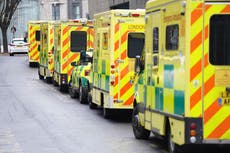NHS safety watchdog sends warning over charging for GP appointments
Charging for appointments would leave people needing more urgent and emergency care, warns Dr Rosie Benneyworth

Charging for GP appointments will worsen patient safety and drive more people to A&E, the head of a national safety watchdog has warned.
Dr Rosie Benneyworth, the chief investigator for the Healthcare Safety Investigation Branch (HSIB), was responding to a suggestion by former health secretary Sajid Javid who said the present model of the NHS was “unsustainable”.
He said “extending the contributory principle” should be part of radical reforms to tackle growing waiting times.
But Dr Benneyworth said it would only drive more people to seek help from already overstretched services.
She said: “I don’t want to be drawn into the politics around this but I believe in free at the point of delivery NHS and my concern would be [if] we charge people that people would not come forward early for their care and that would leave people needing more urgent and emergency care, because of delayed presentations.”
But Dr Benneyworth, who was formerly chief inspector of primary medical services and integrated care for the Care Quality Commission said it was a “myth” that patients not accessing GP appointments had worsened safety in A&Es.
“It’s definitely a myth that we need to dispel. We know that more people are accessing general practice than ever before and there are many more ways of being able to access support from your general practice.”
Dr Benneyworth said there needed to be a bigger focus on patient safety in services outside of A&E, such as NHS 111 and out-of-hours services.
It comes after The Independent revealed the crisis facing NHS111 services with patients waiting half a day for a callback.
She told The Independent that an upcoming report from the regulator would highlight concerns over how the deteriorating well-being of NHS staff was threatening patient safety in emergency care.
Speaking about the report, Dr Benneyworth said: “There is already evidence of a correlation between how staff are feeling [and] the culture in an organisation, how people are valued, and the outcomes of patient safety.”
Dr Benneyworth added: “We’re hearing from staff frustration and distress about them not being able to do their jobs … I’ve worked in the health system for 30 years and I’ve never met anyone who hasn’t wanted to do the right things for people and I think it’s very distressing when you’re not able to get the quality of care that you want to give because of the environmental circumstances that you’re working in.”
“I think there is a risk to patient safety if people are working in high pressured environments … we know that sometimes some of the kinds of behaviours that we see in poor cultures can be kind of enhanced when people are under a huge amount of stress in their workplace.”
Her warning comes after the Royal College of Emergency Care president, Dr Adrian Boyle, said A&E nurses were leaving the NHS in “droves”.
The HSIB chief executive said “exhausted staff” could lead to situations where mistakes happen, could drive more staff into sickness and also mean they do not speak up about concerns because they are so busy.
Speaking about patient safety risks currently facing the NHS she said: “I think if we continually focus on A&E and ambulances, and don’t pay the same attention to the out-of-hospital system, then I think we need to, it will never be able to improve the situation.
“I think likewise, we need to have more focus on NHS 111 and out-of-hours services … they’re vital in the urgent and emergency care pathway and yet, we don’t have the same discussion [about them].”
Join our commenting forum
Join thought-provoking conversations, follow other Independent readers and see their replies
Comments


Bookmark popover
Removed from bookmarks